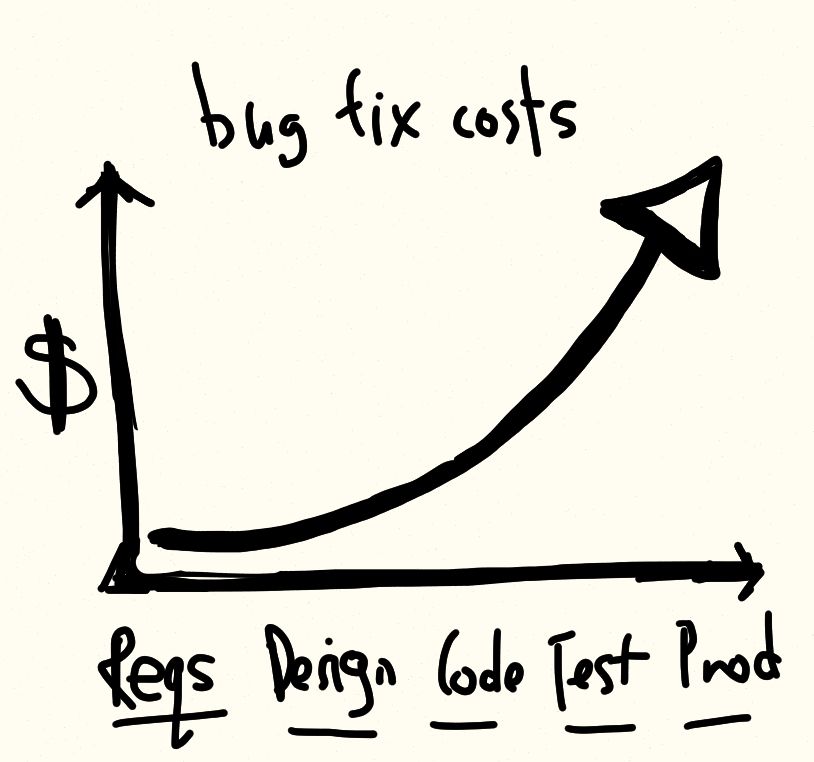So why do we test?
Classical Arguments
There are number of resources on the web talking about testing and the benefits. Most of
the references that I found seem to slant their talks to some daily flavor of
<insert cool name here> Driven Design.
Although most are slanted toward unit tests, I believe this quote from
Uncle Bob Martin is what sums it up nicely:
The act of writing a unit test is more an act of design than of verification.
It is also more an act of documentation than of verification. The act of writing a unit test closes a remarkable number of feedback loops, the least of which is the one pertaining to verification of function
In breaking that statement down into something I can understand:
- Design
- The task of writing tests implies the design. Even if an implicit interface is not required by your particular language, the test is describing that interface in code of exactly what actions an object is supposed to contain.
- Documentation
- A test is the living documentation of expected operation of the individual method of an object. You only have to look at the test to know exactly how to use the object.
- Verification
- A test verifies that the object is behaving as designed. During the Red, Green, Refactor process, a change that breaks the design will fail.
Why do we really test?
I have set through a good number of sessions, read a few books, had lively discussions with
coworkers, and watched a ton of videos. Most tend to go more in depth in the above areas.
The most useful of these are usually the lively discussions.
In a recent session by Richard Campbell, he stated:
All software is tested. It is just a matter of where
I am not sure where that quote originated. Since I heard it from him, he gets the credit.
Seems everyone has opinions on testing, so here are mine:
To prevent Works on my machine problems
This has more to deal with Continuous Integration than the actual writing of the tests.
Every team needs a machine that does nothing but check out the latest code, and execute all
the tests. There are ton of tools out there. Find one you like and implement it.
Developer confidence
The management types believe I write tests to be able to make some line on a chart move in the right direction. Although moving the line is a nice side effect, I write test so I can sleep at night. Not saying that every test I write is 100% valuable. Sometimes I write because I do not fully understand what is going on with some library. Reading documents only me so far. A test is usually a nice easy way for me to grok what is going on.
I know testing is hard, or certainly can be. The only way to get better at something is to do it, A LOT.
With a high confidence level, red turns into good thing. It also means that when I find sub-standard (crappy) code, I can improve the code and know that I have made the world a better place.
Because you need to know fragile(crappy) your code is
Although writing tests can sometimes take more time and effort than just code only. If the method you are trying to test is that hard, then you may want to take another look at the current implementation of the object.
Better written code
Except for the simplest of problems, writing tests and coding to the test will result in better written code. After a good Red, Green, Re-factor session, I can look at my code and ask “Who wrote this? Cuz, there is no way I turned out something this elegant!” I know elegant is a relative term.
Speed is just test away
If you are not worrying about “What you broke” or “Where is it breaking now”, how much more can you get accomplished during the day? Writing good tests go a long way into making the previous statements a reality.

Because you sleep
I know every developer has a mind like a steel trap. Nothing is ever forgotten and recall is instant. This is all possible because developers are not real people. Not only sleeping, but weekends are a constant problem. Leaving myself a busted test to start with on Monday morning is working out really well. If it takes 30 minutes on Monday to remember what you were doing on Friday, just imagine how long it will take after 1, 2, or 6 months?
So when should you write a test?
The usual answer is “all the time”. However, that is not very realistic. The real answer is somewhere between “nothing” and “everything”. The holy grail being “100%” test coverage. As awesome as total coverage can be, the value of that level of testing usually diminishes greatly somewhere after the 80% to 90% mark. Just because you have tests does not mean have quality code.
…Test coverage is a useful tool for finding untested parts of a codebase. Test coverage is of little use as a numeric statement of how good your tests are.
So if the only reason you are writing tests is to meet a metric, you probably should stop and go do something productive.
For every bug
If there is a bug identified in production code, it gets a test. One of the most expensive operations in the development cycle is to fix a bug that made it all the way to production.

Some may ask what the real cost is to fix a production bug. That is a good question, and the answer to that is the standard consultant reply It depends. By the time you get to production, there are way more factors in play than just fixing a minor bug.
- Loss of customer confidence
- Loss of Management confidence
- Stopping progress on current projects/stories
- Restarting of the deployment cycle
- etc…
Bottom line, the faster you can identify and correct a bug, the better.
Edge cases
There are tools that will generate
test cases that will exercise every bit of your code. Go find one and run it sometime and check the results.
They usually do a good job of providing various input that you would never ever think of.
Unless test count is a metric, I usually write only interesting tests. Those interesting tests are the edge cases. For example:
- objects that are null and should never be
- Off-by-1 errors
- Failed external calls
- etc…
Complicated features
Many times the story in play is straight forward and the implementation is straight forward.
When that isn’t the case, my best play has always been to right the tests first. This is
essentially the Design part of the Fowlers quote. By writing the tests based on the requirements,
the tests put you on a path to a coding solution. I look at a lot of code written with
TDD and thought to myself “I would’ve have never written the method that way, or that efficiently.”
To prove to yourself how things really work.
It is pretty much a given that you should never test the framework, unless you are the one writing it. However, I occasionally write tests so that I am sure I understand some aspect of the framework that I want to understand better. Taking the time to write those test has solidified more than a few questions on how a particular framework behaves.
Because someone told you you had to.
Unfortunately, sometimes you just have to write tests whether they have real value.
Links used in this series
- http://en.wikipedia.org/wiki/Unit_testing
- Uncle Bob Martin Quote
- Bug cost image belongs to Alister Scott
